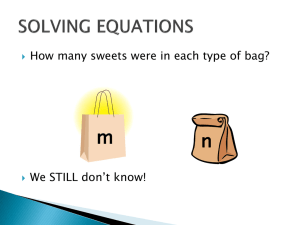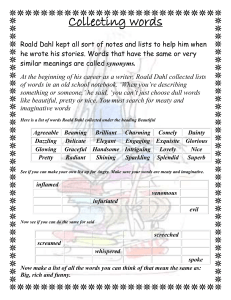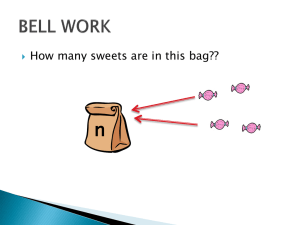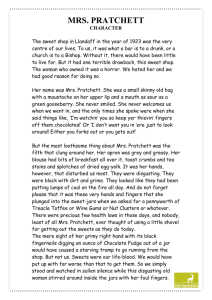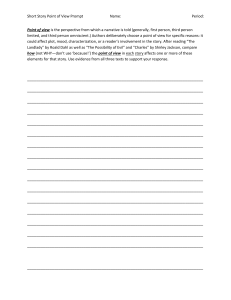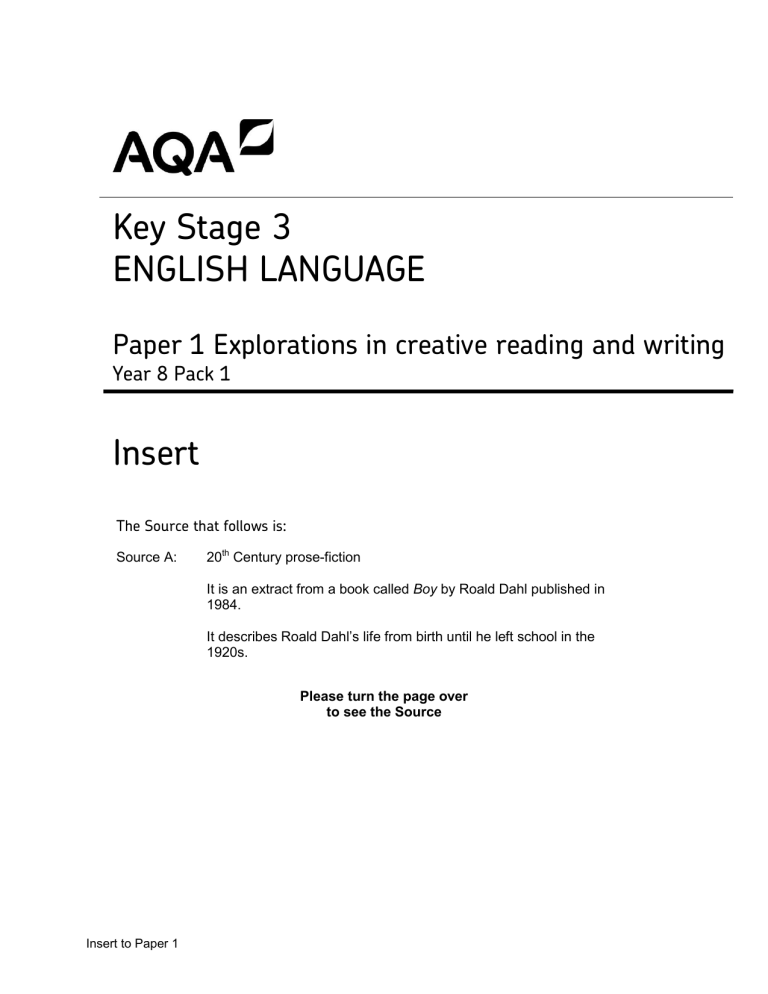
Key Stage 3 ENGLISH LANGUAGE Paper 1 Explorations in creative reading and writing Year 8 Pack 1 Insert The Source that follows is: Source A: 20th Century prose-fiction It is an extract from a book called Boy by Roald Dahl published in 1984. It describes Roald Dahl’s life from birth until he left school in the 1920s. Please turn the page over to see the Source Insert to Paper 1 Source A In this extract, the writer Roald Dahl describes a funny childhood incident, entitled ‘The Great Mouse Plot’. 1 The sweet-shop in Llandaff in the year 1923 was the very centre of our lives. To us, it was what a bar is to a drunk, or a church is to a Bishop. Without it, there would have been little to live for. But it had one terrible drawback, this sweet-shop. The woman who owned it was a horror. We 4 hated her and we had good reason for doing so. 5 Her name was Mrs. Pratchett. She was a small skinny old hag with a moustache on her upper lip and a mouth as sour as a green gooseberry. She never smiled. She never welcomed us when we went in, and the only times she spoke were when she said things like, ‘I’m watchin’ you so keep yer thievin’ fingers off them chocolates!’ Or ‘I don’t want you in ‘ere just to look around! Either you forks out or you gets out’.1 10 But by far the most loathsome thing about Mrs. Pratchett was the filth that clung around her. Her apron was grey and greasy. Her blouse had bits of breakfast all over it, toast-crumbs and tea stains and splotches of dried egg-yolk. It was her hands, however, that disturbed us most. They were disgusting. They were black with dirt and grime. They looked as though they had been 14 putting lumps of coal on the fire all day long. And do not forget please that it was these very 15 hands and fingers that she plunged into the sweet-jars when we asked for a pennyworth2 of Treacle Toffee or Wine Gums or Nut Clusters or whatever. The mere sight of her grimy right hand with its black fingernails digging an ounce of Chocolate Fudge out of a jar would have caused a starving tramp to go running from the shop. But not us. Sweets were our life-blood. We would have put up with far worse than that to get them. So we simply stood and watched in 20 sullen silence while this disgusting old woman stirred around inside the jars with her foul fingers. You can understand why we had it in for Mrs. Pratchett in a big way, but we didn’t quite know what to do about it. Many schemes were put forward but none of them was any good. None of them, that is, until suddenly, one memorable afternoon, we found the dead mouse. 24 My four friends and I had come across a loose floor-board at the back of the classroom, and 25 when we prised it up with the blade of a pocket-knife, we discovered a big hollow space underneath. This, we decided, would be our secret hiding-place for sweets and other small treasures such as conkers3 and monkey-nuts4 and birds’ eggs. One day, when we lifted it up, we found a dead mouse. It was an exciting discovery. Thwaites took it out by its tail and waved it in front of our faces. ‘What shall we do with it?’ he cried. 30 ‘It stinks!’ someone shouted. ‘Throw it out of the window quick!’ ‘Hold on a tick,’ I said. ‘Don’t throw it away.’ Thwaites hesitated. They all looked at me. When writing about oneself, one must strive to be truthful. Truth is more important than modesty. I must tell you, therefore, that it was I and I alone who had the idea for the great and 35 daring Mouse Plot. We all have our moments of brilliance and glory, and this was mine. Insert to Paper 1 ‘Why don’t we,’ I said, ‘slip it into one of Mrs. Pratchett’s jars of sweets? Then when she puts her dirty hands in to grab a handful, she’ll grab a stinky dead mouse instead.’ The other four stared at me in wonder. Then, as the sheer genius of the plot began to sink in, they all started grinning. They slapped me on the back. They cheered me and danced around 40 the classroom. ‘We’ll do it today!’ they cried. ‘We’ll do it on the way home! You had the idea,’ they said to me, ‘so you can be the one to put the mouse in the jar.’ Glossary: ‘Either you forks out…’1 – she is saying that she wants them in the shop only if they are buying sweets. pennyworth2 – most sweets used to be weighed out from glass jars and a pennyworth was the amount of sweets that could be bought for one penny. conkers3 – the nut of the Horse Chestnut tree. A large reddish-brown round nut that children used to play games with. monkey-nuts4 – an old name for peanuts, in their shells. END OF SOURCE Insert to Paper 1 There are no Sources printed on this page Acknowledgement of copyright holders and publishers Permission to reproduce all copyright material has been applied for. In some cases, efforts to contact copyright holders have been unsuccessful and AQA will be happy to rectify any omissions of acknowledgements in future papers if notified. Source: Boy by Roald Dahl, © Johnathan Cape Ltd & Penguin Books Ltd 2013 Copyright © 2014 AQA and its licensors. All rights reserved. Insert to Paper 1

